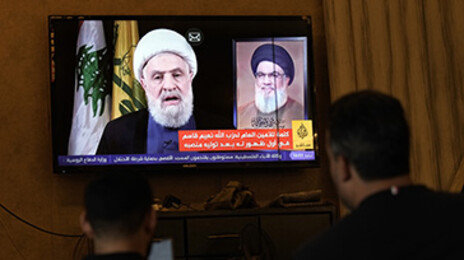By Robert J. Einhorn
Among the issues that will be discussed during Kim Jong-il's surprise visit to Beijing will be U.S. measures to stop DPRK counterfeiting and other illicit activities and the relationship of those measures to the 6-party talks. North Korea has argued that the measures are unjustified and must be discontinued for the 6-party talks to proceed. Hopefully China and the other participants in the talks will not allow this latest DPRK tactic to succeed. U.S. efforts to deal with Pyongyang's illicit activities are not only justified; they can - if pursued in a constructive manner - give the North additional incentive to reach agreement on the nuclear issue. But if they are intended and used as a means of achieving regime change, they are likely to fail in that objective and ensure gridlock in the negotiations.
"While under U.S. sanctions, it's impossible to sit face-to-face and discuss abandoning our nuclear deterrent," the North Koreans declared recently in a Rodong Sinmun commentary. But during the 1990s, when comprehensive U.S. sanctions against the DPRK were in place and the U.S. actively discouraged other countries from buying DPRK missiles, the North Koreans largely ignored U.S. efforts to deny them illicit sources of hard currency, and they proceeded with negotiations on both nuclear and missile issues. In recent months, Pyongyang hardly reacted to the June 2005 Executive Order blocking the U.S. assets of several North Korean entities or to the September 2005 U.S. Treasury directive requiring U.S. financial institutions to sever any financial ties with Macau's Banco Delta Asia because of its role in facilitating illicit North Korean activities. Only later, during the November 6-party round and subsequently, has the North Korean regime linked such measures to participation in the negotiations.
Why has Pyongyang adopted this new tactic? One explanation is that the North is using the sanctions as a pretext to avoid returning to the talks because it fears isolation over LWRs and other issues. Or perhaps it is using the linkage as a bargaining chip and will trade it away in exchange for something else. Another possible explanation is that Pyongyang sees recent U.S. steps - especially the December 13th U.S. Treasury advisory urging financial institutions worldwide to "take reasonable steps to guard against the abuse of their financial services by North Korea" - as a serious threat and hopes to use its boycott of the talks as leverage to roll back the sanctions or at least discourage others from joining Washington's efforts. Current talks between Kim Jong-il and Chinese leaders may result in North Korea abandoning or modifying its linkage, and they may shed some light on the motivations for Pyongyang's new tactic.
Whatever the explanation, U.S. measures to stop illicit DPRK activities are justified and should not be lifted as long as those activities persist. As many South Korean commentators have recognized, activities such as currency counterfeiting and drug trafficking are crimes that cannot be tolerated. The international community should not have to choose between stopping those crimes and resolving the nuclear issue. Both should be pursued concurrently - and separately.
Indeed, international pressures against North Korea's illegal or irresponsible (e.g., missile sales) activities can reinforce efforts to persuade Pyongyang to abandon its nuclear weapons program. They can do so by sending a clear message to the North that it can no longer count on illicit sources of income and that, if it wishes to meet its minimum economic goals, it must take advantage of the generous benefits available under the agreement outlined in the September 19th Joint Statement.
But that message will only have the desired impact if the North Koreans believe that altering their behavior - in the nuclear field as well as in the area of illicit activities - will reliably bring the anticipated rewards, including the end of sanctions, other economic and security benefits, and eventually normal relations with the U.S. Today, however, DPRK leaders are probably perceiving mixed signals in this regard. On the one hand, they see the Joint Statement commitment for the U.S. to "respect each other's sovereignty, exist peacefully together, and take steps to normalize their relations." But on the other hand, they presumably sense what observers in Washington are sensing - that the Bush Administration remains divided between those ready to accept a negotiated solution and those who believe the only way to change North Korea's behavior is to change the current regime in Pyongyang.
The latter group sees pressures and sanctions against illicit activities not as a way of complementing and reinforcing the negotiating track but as means of weakening the regime and eventually bringing about its collapse. Supporters of this view are making a serious miscalculation. Reducing illicit sources of income can put additional pressure on Kim Jong-il's regime but cannot bring it down, especially as long as China and South Korea are determined to provide whatever assistance is necessary to keep it afloat.
So the U.S. should continue its efforts to put an end to North Korea's illicit activities, but it should do so in a way that supports rather than undermines prospects for a nuclear agreement.
First, it should give minimal publicity to the steps it is taking. As the DPRK finds out that financial institutions are no longer willing to launder money for its schemes, it will get the message. Publicizing the steps will only force the North Koreans to react and make it more difficult for them to de-link the illicit activities from the 6-party talks.
Second, rhetoric should be avoided that focuses unduly on the regime itself rather than on its behavior. "Criminal regime" - however suitable the label may be - is more gratuitously provocative than "criminal activities."
Third, pressure against illicit activities must not be strictly a U.S. campaign, which allows Pyongyang to dismiss it as part of America's "hostile policy" to stifle the regime. Measures to stop those activities should have broad international support, including from China, South Korea, and Russia. Gaining their support will require the U.S. to share more evidence about DPRK wrongdoing.
Fourth, U.S. efforts should be directed at ending illicit activities, not just penalizing North Korea for them. Sanctions should not be viewed as an end in themselves but as a device for promoting better behavior. The U.S. should be willing to sit down with the North Koreans, explain why sanctions were imposed, and outline what credible, monitorable steps North Korea must take to get the penalties lifted.
Above all, the U.S. needs to demonstrate convincingly, through words and actions, that it is serious about its Joint Statement pledge to normalize relations with the North Korean regime if it genuinely alters its behavior. By doing so, it will give a boost both to the 6-party talks and to efforts to stop illicit activities. And if Pyongyang persists in dragging its feet on implementation of the Joint Statement, it will be clear where the responsibility lies.
Robert J. Einhorn, currently at the Center for Strategic and International Studies, was Assistant Secretary of State for Nonproliferation from 1999 to 2001.
세계의 눈 >
-

부동산 빨간펜
구독
-

이주현의 경매 길라잡이
구독
-

횡설수설
구독
-
- 좋아요
- 0개
-
- 슬퍼요
- 0개
-
- 화나요
- 0개
-
- 추천해요
- 개
![[세계의 눈/제라르 뱅데]과학기술 꽃피운 하나된 유럽](https://dimg.donga.com/a/180/101/95/2/wps/NEWS/IMAGE/2006/01/20/6962680.1.jpg)



댓글 0